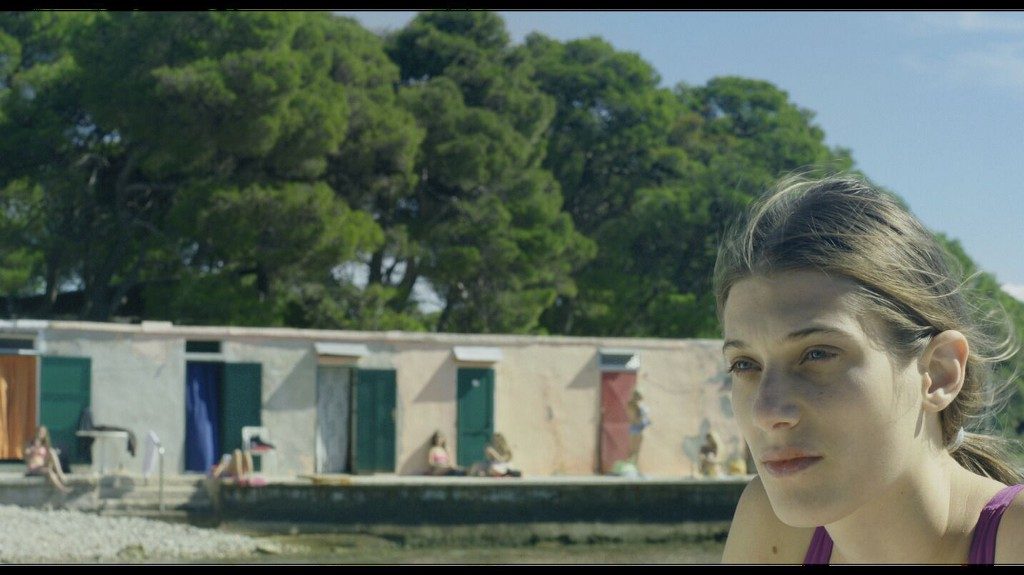Hana Jušić has written and directed several award-winning short fiction and documentary films which have been shown at prominent European festivals. Her credits include “No Wolf,” “Gnats, Ticks and Bees,” and “Terrarium.” “Quit Staring at My Plate” is her debut feature.
“Quit Staring at My Plate” is Croatia’s submission for the 2018 Academy Award for Best Foreign Language Film.
W&H: Describe the film for us in your own words.
HJ: The film is a dark comedy about a 20-something girl from my hometown on the coast of Croatia. She is trying to grow and cope with her life in an environment that is not very enticing, to say the least. She lives with a quirky, but at the same time oppressive family whose members keep “staring at her plate,” not really letting her grow up, but at the same time expecting from her to be the breadwinner for the family. The entire film is actually her just trying to breathe in.
W&H: What drew you to this story?
HJ: I was driven by the main character. Since I started thinking about making films, I wanted to make a film around this particular female character — a woman that is, in a way, outside the patriarchal system, but not because she has thought about it much. She’s a natural rebel. She just doesn’t fit into the [stereotypes about women that are common] in this particular Mediterranean mentality. She is androgynous, terse, closed, but at the same time there is something mesmerizing in her hidden strength.
The lead is not a professional actress. I scouted her at a beach and when I saw her, I just knew she is that girl. She had that particular quality about her. I was very lucky with her because it turned out she is a great actress as well.
W&H: What do you want people to think about when they are leaving the theater?
HJ: I would like the people to feel gentleness and warmth towards my characters, to like them in spite of [some of their behavior]. I would like the ending to make them feel a bit sad, but at the same time to understand why Marijana stays and doesn’t build a cool, new life. She doesn’t grant them the ending we’re used to seeing in films — [it’s the ending more common] in real life.
Sometimes people are really moved by the film, but it saddens them more than I had intended to. It is kind of funny because my intention was to make a comedy, but it turned out darker than expected.
W&H: What was the biggest challenge in making the film?
HJ: Since it is my first feature, the biggest challenge was not to let my beginner’s mistakes spoil the way I would have liked the film to turn out.
Since I only did short student films before, I was fighting with myself to stay strong for the entire shoot of 36 days, often panicking and going crazy inside. I had to give the impression of being in control and knowing what I was doing.
W&H: How did you get your film funded? Share some insights into how you got the film made.
HJ: The film was funded by Croatian Audiovisual Centre. We also got a Danish co-producer. We met Peter Hydahl from Beofilm at a pitching market, and he immediately liked the project, so we applied for the Danish fund and got funded as well. Later we also got some funding from Eurimages. So I have to say we have been lucky.
W&H: What does it mean to have your film included in the Academy long list for a foreign language Oscar?
HJ: It is a great feeling. I have been growing up dreaming of this, never thinking I would be making films, let alone be the Croatian Oscar candidate with my first feature. I am happy to come to the United States and present the film. I want to see how it gets received.
W&H: What’s the best and worst advice you’ve received?
HJ: The worst advice: I am too shy and not aggressive enough to be a film director.
The best advice: film directing is about something else — not about the character of the director.
W&H: What advice do you have for other female directors?
HJ: To stay strong and focused, to read, watch, and know more than their male colleagues. Make it as difficult as possible to be disregarded.
W&H: Name your favorite woman-directed film and why.
HJ: “La Ciénaga” by Lucrecia Martel and “Longing” by Valeska Grisebach.
W&H: There have been significant conversations over the last couple of years about increasing the amount of opportunities for women directors yet the numbers have not increased. Are you optimistic about the possibilities for change? Share any thoughts you might have on this topic.
HJ: In European cinema I have a feeling it is changing. Maybe when you look just at the numbers, not so much, but I have a feeling female filmmakers aren’t being regarded as an aberration anymore.
In Croatia there are many young girls that have just finished film school and I really hope we will be seeing some really cool films by them. I don’t know much about how Hollywood works, but I think the situation is still very discouraging when it comes to female directors.







